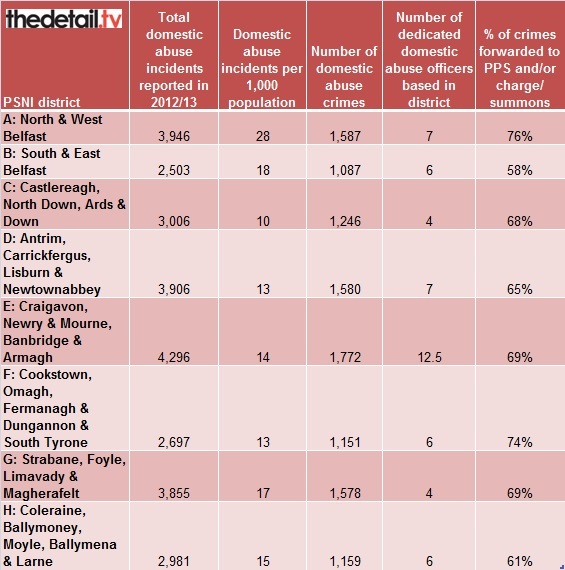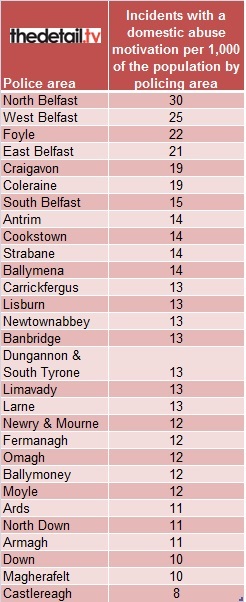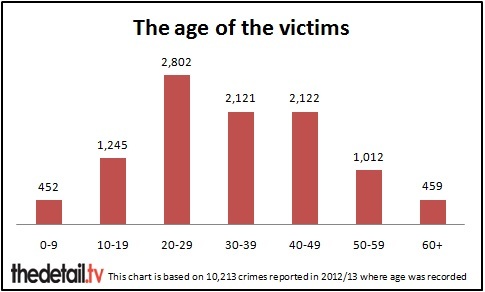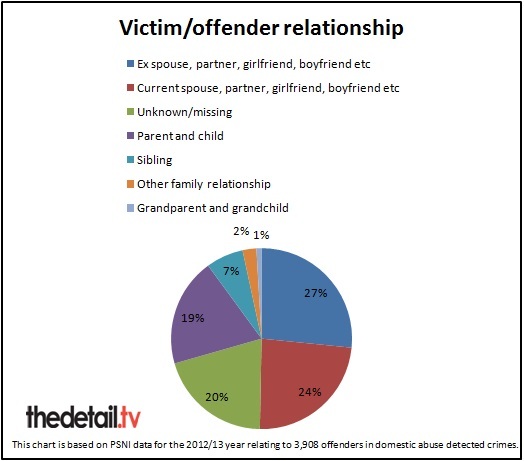View A year of domestic abuse in Northern Ireland in a full screen map
By Kathryn TorneyAN investigation by The Detail has provided disturbing evidence of the devastating impact domestic abuse has on thousands of individuals and families across Northern Ireland every year.
We have carried out an in depth analysis of the 27,190 incidents of domestic violence recorded by the Police Service of Northern Ireland (PSNI) during the 2012/13 financial year. These include cases of murder, violent assault, abduction of children, incidents with multiple victims and sexual assaults.
The victims are women, men and young children and the crimes took place right across Northern Ireland.
Readers can use our interactive map above to examine the domestic abuse reported in their area and read case studies which are among the incidents investigated by the police in the last financial year.
Our investigation found that the percentage of all recorded crimes which the PSNI forwarded on to the Public Prosecution Service (PPS) and/or a charge summons issued ranges from 78% in the West Belfast area to just 57% in South Belfast and Ballymoney police areas.
The cases we have examined include:
- Violent crime including five murders. Three men murdered in the police areas of Fermanagh, Dungannon and South Tyrone and Ballymena and two women in Lisburn and Magherafelt. There were also 24 attempted murders, 594 threats to kill, 217 assaults with intent to cause serious harm and 3,347 assaults with injury.
- 172 rapes – including 35 of children aged nine or younger.
- 23 cases of kidnapping and 12 of child abduction.
- 918 ‘other offences against the state and public order’. These are mostly breaching non-molestation orders. No age or gender details are provided for these crimes.
- 404 sexual offences.
It is against this disturbing backdrop that we can also reveal today that the Northern Ireland Executive’s eight member Inter-Ministerial Group on Domestic and Sexual Violence has met only five times since 2008 with its last meeting taking place over a year ago.
This group was established to give priority to domestic and sexual violence and to enable Ministers to apply a joined up approach to deliver change.
We last reported on the poor attendance of the Executive Ministers in July 2012 and at that time a representative from Women’s Aid said the attendance was “totally unacceptable”.
It appears that the situation has not improved – although the Department of Health stressed that it has been working with the Department of Justice to develop a new joint Domestic and Sexual Violence and Abuse Strategy.
We also requested data from the Housing Executive which shows that during the 2012/13 financial year 855 households presented as homeless with domestic violence cited as the reason. Of these, 18% were placed in temporary accommodation. The remaining 82% either made their own arrangements or the NIHE determined it did not have a statutory duty to provide temporary accommodation.
The “median” time for applicants deemed as homeless because of domestic violence to be allocated somewhere else to live by the Housing Executive during the year 2012/13 was 21 months.
The Housing Executive has also confirmed that 24 of its properties have been fitted with “sanctuary rooms”. These are safe rooms within homes where people at risk of domestic violence can wait for the police if they are in danger.
The rooms include heavy duty door locks, collapsible security grills, smoke alarms and a mobile phone to call for help.
To read more on the Housing Executive figures, click here.
In September 2011, we reported on the horrendous abuse suffered by one young woman from Northern Ireland, Abigail Lyle. Abigail – whose story can be read here – is just one of many hundreds of people living here to have suffered at the hands of a violent partner.
OUR DATA REQUESTOur main data analysis is based on detailed PSNI domestic abuse data we requested using Freedom of Information legislation.
We received a detailed breakdown of each of the 27,190 domestic abuse incidents reported to the PSNI during the 2012/13 financial year. This equates to an average of 74 incidents reported every day or more than 520 every week.
Domestic abuse is any incident of threatening behaviour, violence or abuse inflicted on one person by another where they are or have been intimate partners or family members.
For each case we were told what crime (if any) was committed, the gender and age group of the victim, the police area and district the incident occurred in and the outcome of the police investigation. Individuals cannot be identified from the information we requested.
The information also includes the month each incident/crime took place and whether this was in the 2012/13 year or prior to this. Seventy-two percent of the incidents reported took place in 2012/13. The gap between an offence occurring and being reported can be days, months or years in length. Of the other incidents, the date is missing for 6,933 cases and listed as “pre-2012/13” for 551.
The incidents are also likely to involve repeat offenders and victims but this cannot be determined from the data provided to us.
A total of 11,160 crimes were recorded relating to 9,821 of the incidents. A single incident can contain multiple crimes. However, not all domestic abuse incidents will result in the recording of a crime.
Of all of the crimes recorded, the data provided to us shows that 7,460 (67%) of the 11,160 crimes were sent on to the Public Prosecution Service (PPS) to be considered for prosecution. A caution was issued in seven other cases and 130 crimes resulted in charge/summons but were not sent on to the PPS.
For the 10,207 crimes with the gender of the victim recorded, 70% were female. On a police area basis this ranged from 63% female in Armagh to 74% in Carrickfergus, Magherafelt and West Belfast PSNI areas.
Over 3,000 (3,029) of the victims were male.
The PSNI’s annual domestic violence report gives the victim/offender relationship for only 3,908 domestic abuse detected crimes. Over 50% of the offenders in these cases were the ex or current partner/spouce/girlfriend/boyfriend of the victim.
The largest number of reported domestic abuse incidents occurred in the North Belfast police area (2,406) followed closely by Foyle (2,405). The lowest number was in Moyle (197).
Comparing the number of incidents with a domestic abuse motivation per 1,000 of the population in each area shows a massive difference between the highest and lowest – 30 in North Belfast compared to eight in the Castlereagh area.
The incidents forwarded on to the PPS to be considered for prosecution range from 19% of cases in Larne to 37% in Fermanagh. A large volume of cases were not forwarded on in Foyle police area (1,772) and North Belfast (1,745).
The PSNI determined that crimes had been committed during 9,821 incidents.
The percentage of all recorded crimes forwarded on to PPS and/or a charge summons issued ranges from 78% in the West Belfast area to just 57% in South Belfast and Ballymoney police areas.
Many cases provide evidence of children being caught up in violence at home. As well as thousands of young people witnessing abuse, in some cases they become the victims of violence or sexual assault themselves.
Of the crimes we have information on, the victim was aged nine or younger in 452 cases and between 10 and 19-years-old in 1,245 cases. The crimes they were victims of include rape, physical and sexual assaults, cruelty, threats to kill and child abduction.
Detection information was only provided by the PSNI for 3,720 crimes. Of these, a charge/summons was issued in 3,402 cases, 309 cautions, 7 penalty notices for disorder and two ‘no prosecution directed’ for two separate rapes. The victims of the rapes were a female child aged 0-9 in Limavady PSNI area and a young girl aged 10-19 in the Fermanagh area.
MULTIPLE CRIMESSome incidents involved more than one crime. One incident which took place in August 2012 in North Belfast involved seven crimes and the assault of at least three female victims.
Another incident in September 2012 in the Omagh area involved five crimes involving cruelty against at least two children aged nine or under and at least one young female aged between 10 and 19.
An incident which took place in July 2012 in west Belfast had at least four victims of assault with and without injury and threats to kill. The victims were women in their 20s, 30s and 50s and a man in his 30s. A file was forwarded to the PPS. However, the ‘detection category’ column is blank.
In October 2012 in Ards police area there were five victims of assault with/without injury in a single incident. The victims were two men in their 30s and 40s, two women in 30s and 40s and young woman aged between 10 and 19. In this case, a file was not forwarded to the PPS.
The kidnapping of a girl aged nine or under, a boy aged nine or under and a young girl aged between 10-19 and assault of a woman in her 30s took place in March 2012 in the Omagh area. A file was sent to the PPS resulting in a charge/summons for one of the kidnapping charges and the assault.
In January 2013 there was an incident in the Newry and Mourne area which included threats to kill a woman in 30s, a boy aged nine or under and a girl aged between 10 and 19. Also harassment of a woman in her 30s. Charge/summons was issued in relation to the harassment.
THE PSNI RESPONDS TO OUR QUESTIONSWe put a series of questions to the PSNI regarding our key findings from our analysis of the 27,190 domestic abuse incidents.
The service’s response in full can be seen here.
We asked why detection information was provided for only 3,720 of the 11,161 domestic abuse crimes committed during 2012/13 while the rest remain blank.
A spokeswoman said: “At the time the data was extracted in response to this FOI, the offence in question had not been ‘detected’.”
It could be that the file is still being considered by the Public Prosecution Service (PPS) or there may be insufficient evidence for it to be considered by the PPS.
We asked for an explanation on the reason for the differences between areas of Northern Ireland when it comes to a file being sent on to the PPS. Looking solely at domestic abuse crimes, the percentage forwarded on to the PPS and or charge/summons ranges from 57% in South Belfast to almost 78% in West Belfast. By district, this ranges from 58% in District B to 76% in District A.
The PSNI response includes: “In determining whether a file should be sent to the PPS, the test to be applied within protocols between PPS and PSNI, is whether there is evidence that can be adduced at court to connect the suspect to the offence. This is not always a straightforward issue to determine and is made more difficult in domestic violence cases in particular as unfortunately it is not uncommon for a victim to subsequently not wish to pursue an allegation.
“A team of dedicated inspectors known as ‘service gatekeepers’, were introduced to the PSNI in September 2011 to help provide consistent advice to investigating officers regards the most appropriate case disposal option and this has had a positive effect. However individual districts may also adopt local policies to send files to the PPS even where this test is not met as part of a package of measures to tackle this crime.”
We also asked why the number of specialist domestic abuse officers based in District E is much higher than elsewhere – 12.5 officers compared to the next highest of seven specialist officers in Districts D and A.
The response was: “Each district allocates its own domestic abuse officers, depending on local need as part of their response to tackling this type of crime.
“However it is also important to remember that domestic abuse officers are not the only ones dealing with incidents of domestic abuse. Response and neighbourhood officers and detectives from CID also deal with incidents.”
The spokeswoman added that the framework allows for a consistency of approach across Northern Ireland “whilst allowing a tailored focus on local harm and crime trends”.
“AN AVERAGE OF 5 PEOPLE DIE EACH YEAR FROM ASSAULTS BY CURRENT OR FORMER PARTNER”Dr John Devaney, director of Social Work Education at Queen’s University Belfast, said that domestic violence remains a very significant and serious social, health and legal issue in Northern Ireland.
He said: “Undoubtedly there has been an improvement in the past decade in the recognition of domestic violence by the general public, government agencies and professionals.
“The challenge is now in finding ways to respond that support victims whilst also ensuring that those who perpetrate abuse to the current or former partners are provided with the services that address their harmful behaviour.”
Dr Devaney also spoke about the geographical differences we found in the PSNI data.
“It is interesting to note that the number of incidents of domestic violence reported to the police has increased recently, although the trend is fairly consistent – the police need to respond to an incident once every twenty minutes of every hour of every day.
“However the variation between police districts highlights many of the challenges in dealing with such a common yet untalked about issue – services are more limited in rural areas, victims with children are reluctant to move long distances to new housing because of the disruption to children’s education, and victims still report that some professionals they deal with have a very basic understanding about the nature and impact of violence and abuse in close relationships.”
He continued: “It is encouraging that some services have become more responsive to the needs of victims over the past few years but there are also significant challenges.
“Many victims report difficulties in obtaining new housing quickly that meets their needs to be close to protective family members and allows their children to remain at the same school; male victims often feel that services do not recognise their experiences; and women are still most likely to be seriously injured or die as a result of the abuse they experience.
“It is distressing to know that on average five people die each year in Northern Ireland from assaults by their current or former partner.”
He referred to the new strategy being developed to tackle domestic and sexual violence here and added that the continued high incidence of abuse and violence between current or former partners demands that we do three things very well over the next few years:
- Introduce measures to prevent domestic violence occurring in the first instance, such as work with children on showing respect and developing healthy relationships and learning ways to resolve differences.
- Where domestic violence does occur ensure that victims receive prompt and comprehensive support.
- Ensure that those who perpetrate domestic violence take responsibility for their behaviour through structured programmes of work and where necessary the courts.
Earlier this month, Criminal Justice Inspection (CJI) in Northern Ireland said that limited progress had been made against inspection recommendations relating to domestic violence and abuse from 2010.
Of the 13 recommendations which aimed to strengthen how criminal justice agencies handle incidents of domestic violence and abuse only one was assessed as achieved, six as partially achieved and six not achieved.
In a statement issued to The Detail, Brendan McGuigan, CJI chief inspector, said: “The review emphasises that the PSNI still needs to develop a more consistent approach in both the investigation of cases and initial support for victims in following through with their complaints.
“For example in 2010 CJI urged the PSNI to adopt a more consistent approach to how officers respond to incidents of domestic violence and abuse. The report also recommended the police review the role of the domestic abuse officer and consider training a proportion of officers working in this area to higher investigative standards.
“However in 2013 the necessary decisions and actions to address this at a senior level had yet to be undertaken.”
Mr McGuigan said that inspectors found that differences in practice and approach still remained between different PSNI officers and police districts, despite the further development of the PSNI domestic incident policy aimed at fostering a consistent approach. A wider review of operational policing was also found to have stalled work to assess the role and skill set of domestic abuse officers.
He continued: “The PSNI have reassured CJI of their intention to take the strategic decisions required by the end of 2013 to agree the forthcoming management structures for this area of work. CJI have accepted the offer of an update on this by PSNI at the end of the year.
“However CJI also intend to return to this topic in 2015 with a full inspection.
“The inspectorate believes that a failure to address the recommendations in the original report could lead to continued or greater inconsistencies in service for victims, a potential loss of evidence in relation to domestic crimes and therefore perpetrators not being held to account for their offences, with a possible increase in risk for current or future victims.”
THE DEPARTMENT OF HEALTHHealth Minister Edwin Poots chairs the Inter-Ministerial Domestic and Sexual Violence group.
In response to our query about when the group last met, his department confirmed that the November 2012 meeting has been the only meeting to take place since May 2012.
A spokesman said: “Since the inter-ministerial group last met, the Department of Health, Social Services and Public Safety and the Department of Justice, as the lead departments in tackling domestic and sexual violence, have been developing the new joint Domestic and Sexual Violence and Abuse Strategy.
“It is intended that the new strategy will issue for public consultation towards the end of November 2013, with the final strategy to be published in the early 2014/2015 financial year.
“A key achievement of the Tackling Sexual Violence and Abuse Strategy was the opening of Northern Ireland’s first Sexual Assault Referral Centre in May 2013. This regional facility, known as The Rowan and located at Antrim Area Hospital, raises the standards of care for all victims (male and female adults and children) of sexual assault, including victims of sexual violence within intimate relationships. The Rowan delivers a 24/7 service, 365 days per annum.”
The police can be contacted on 0845 600 8000 or 999 in an emergency. A 24 hour Domestic Violence and Sexual Violence helpline number can also be contacted on 0808 802 1414.




